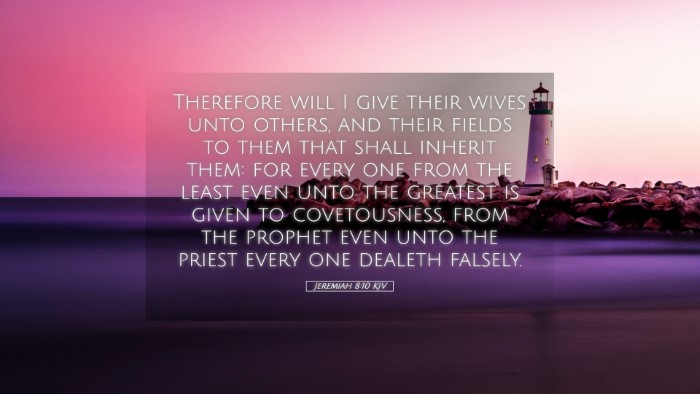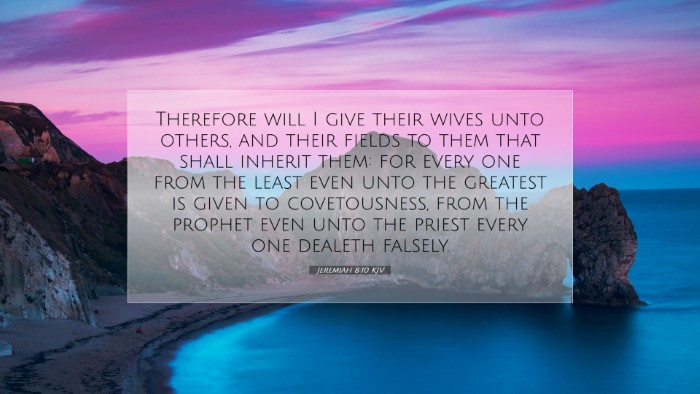Commentary on Jeremiah 8:10
Jeremiah 8:10 (KJV): "Therefore will I give their wives unto others, and their fields to them that shall inherit them: for every one from the least even unto the greatest is given to covetousness, from the prophet even unto the priest every one dealeth falsely."
Introduction
This verse arises in a context of divine judgment and lamentation over the moral and spiritual state of Judah. Through the prophet Jeremiah, God reveals the inevitability of the consequences borne from the people's sins. This commentary highlights the gravity of their sinfulness and the broadness of the consequences that follow.
Contextual Analysis
When considering Jeremiah 8:10, it is essential to examine the verses that precede and follow it to fully appreciate the significance of this pronouncement. Jeremiah proclaims a message of impending judgment and the dire situation of a society steeped in sin, particularly highlighting the roles of the clergy and the laity alike.
Matthew Henry’s Insights
Matthew Henry emphasizes that this verse serves as a declaration of God's judgment on Judah. He notes that the leaders, from "prophet even unto the priest," are implicated in the failure to lead the people toward righteousness. The covetousness that pervades society demonstrates a deep-seated moral decay that affects everyone, suggesting that sin has infiltrated all levels of society.
Key Themes from Henry
- Divine Judgment: Henry emphasizes that God’s decision to give their wives and fields to others reflects the seriousness of the transgressions committed.
- Universal Corruption: The phrase “from the least even unto the greatest” underscores the pervasive nature of sinful desires, showing that no one is exempt from culpability.
- False Dealings: Henry points out the duplicity among leaders who mislead their flocks, indicating that those who should advocate for truth have become purveyors of falsehood.
Albert Barnes’ Contributions
Albert Barnes extends this commentary by exploring the implications of God’s statement regarding the possessions of Judah. He elucidates that the transfer of wives and fields signifies not only loss but also judgment in terms of community stability and familial integrity.
Barnes’ Key Observations
- Loss of Inheritance: The loss described in this verse suggests a severance of familial ties and heritage, a powerful symbolism of the judgment against idolatry and corruption.
- Social Disorder: Barnes indicates that the verses reflect turmoil and chaos in society, where basic social bonds are disrupted due to sin.
- Hope Amid Judgment: Although the passage speaks of judgment, Barnes urges readers to seek understanding of God’s grace even in discipline, highlighting God’s desire for repentance.
Adam Clarke’s Interpretations
Adam Clarke approaches this text with a pastoral lens, concerned with the practical realities faced by the people of Judah. He recognizes the emotional weight of the loss prophesied and the societal implications it brings.
Insights from Clarke
- Empathy in Judgment: Clarke notes that God’s intentions are rooted not only in punitive measures but also in a divine longing for restoration and truth among His people.
- Cultural Reflection: Clarke brings attention to the cultural context where marriages and landholdings were critical to the identity and continuity of society, making the consequences even more poignant.
- Call to Authenticity: Clarke advocates for a return to sincerity in worship and leadership, recognizing the necessity for integrity amidst prevailing corruption.
Theological Implications
The theological ramifications of Jeremiah 8:10 extend beyond the historical context of Judah. The verse serves as a stark reminder of how divine justice manifests in societies burdened by sin. It calls for introspection on the state of the church and its leaders today and encourages a renewed commitment to holiness and truth.
Response to God’s Word
This passage challenges modern readers to reflect on their own lives and congregations. Pastors, students, theologians, and scholars are urged to consider how covetousness and deceit may manifest in their contexts and strive towards a collective pursuit of integrity in all matters.
Conclusion
In conclusion, Jeremiah 8:10 encapsulates a powerful message of warning and judgment that has reverberated through generations. The insights provided by Matthew Henry, Albert Barnes, and Adam Clarke enhance our understanding of the text, prompting a deeper engagement with its themes of sin, judgment, and the human condition.


